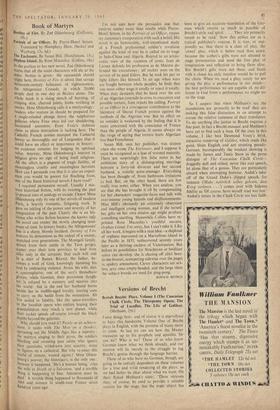Book of Martyrs
IN the preface to her new novel, Zod Oldenbourg
Warns that all the main characters will die at the stake. Notice is given : the squeamish should
alight here. Destiny of Fire is about that savage
thirteenth-century holocaust of righteousness, the Albigensian Crusade, in which 20,000 People died in one day at Biers alone. The
Whole book is a rising stench of burning, of crisping skin, charred joints, limbs writhing in smoke. Mme Oldenbourg calls it a martyrology : readers who venture in should be prepared for a single-minded plunge down the sulphurous galleries where Foxe once led our shuddering, fascinated ancestors. Even Foxe's dubious claim to pious instruction is lacking here. The Catholic French armies stamped the Catharist heresy so thoroughly out of Languedoc that it could have no effect or importance in history : no evidence remains for judging its spiritual value. Anyway, Mme Oldenbourg's interest in religion gives no sign of being itself religious. All she oilers is a pageant of tragic futility, of meaningless cruelty and meaningless heroism. How can I persuade you that it is also an experi- ence you would be poorer for flinching from, one of the finest historical novels I have read?
I required persuasion myself. Usually I mis- trust historical fiction, with its twisting the past to present uses of analogy or escape. I knew Mme Oldenbourg only by one of her novels of modern Paris, a heavily romantic, fatiguing work. It gave no inkling of the power and severity of her imagination of the past. Clearly she is an his- torian who writes fiction because she knows only the novel can render the slowly changing land- scape of time. In history books, the Albigensians' fate is a sharp, bloody incident. Destiny of Fire restores its dimensions as the ordeal of a society, stretched over generations. The Montgeil family, driven from their castle in the Tarn gorges, scatter over their torn province to lead lives alike only in the certainty that each will end in a shirt of flames. Ricord, the father, be- comes a wolf of God, knowingly damning his soul by embracing violence. Arsen, his wife, dies a contemplative, one of the sect's threadbare glories. while Gentian, their passionate daugh- ter, is refused by a nunnery and marries into the world: but in the end her husband burns beside her in middle-aged loyalty, leaving sons to carry on the battle from the mountains. All live sealed in fatality, like the space-travellers in the Swedish opera who endure hoping their grandchildren may reach a new planet. while their rocket speeds off-course toward the black depths beyond the galaxies. Why should you read it? Purely as an achieve- mem, it ranks with The Man on a Donkey. spreading out the Middle Ages like a tapestry : the martyrs singing to their pyres, the soldiers bleeding and sweating past saints who ignore their questions, withdrawn into sanctity, stony as figures on a cathedral. But why re-enter this world of remote, wasted agony? Mme Olden- bourg's answer, the historian's, is the only one : because it happened. 'He's a human being.' cries the wife in Death of a Salesman, 'and a terrible thing is happening to him. Attention must be Paid.' A terrible thing happened to thousands of men and women in south-west France seven hundred years ago. I'm not sure how she persuades one that motives matter more than results while Pierre- Henri Simon, in his Portrait of an Officer, rouses my customary exasperation with such a belief. His novel is an honourable, well-intentioned study of a French professional soldier's revulsion against the kind of war he is called on to wage in Indo-China and Algeria. Reared to an aristo- cratic View of the vocation of arms, Jean de Larsan defends his profession as de Maistre de- fended the executioner : all society rests on the service of its paid killers. But he took his pay to fight killers like himself. In an age when wars are fought between whole peoples, he finds that one must either wage it totally or reject it totally. When duty demands that he hand over the son of an Algerian comrade-in-arms to execution and possible torture, Jean rejects his-calling. Portrait of an Officer is a courageous contribution to the literature of liberal French protest against the methods of the Algerian war. But its effect on an outsider is weakened by the feeling that it is more concerned with the conscience of France than the people of Algeria. It seems always on the verge of saying that torture hurts Algerians less than Frenchmen.
Susan Hill, says her publisher, was sixteen when she wrote The Enclosure, and I suppose it must be recognised as a feat of wrested maturity. There are surprisingly few false notes in her ambitious story of a disintegrating marriage between a forty-ish divorcee and her second husband, a volatile actor-manager. Everything has been thought of, from bathroom irritations to bed. But, on the other hand, there arc few really true notes, either. When you analyse, you see that she has brought it off by compensating for her characters' magazine-faces and talk with over-intense young hatreds and disillusionments. Miss Hill's obviously an extremely observant and intelligent young woman, and if she turned her gifts on her own elusive age might produce something startling. Meanwhile Collins have re- printed Rose Macaulay's youthful success, Orphan Island. I'm sorry, but I can't take it. Like all her work, it begins with a neat idea---a shipload of orphans marooned on a Marvellous island in the Pacific in 1855, rediscovered seventy years later as a thriving enclave of Victorianism. But before its possibilities for Straeheyan or Swiftian
satire can develop, she is chasing off after bees- in-the-bonnet, scampering sidewise over the pages in spidery amusement. Clever characters are sex- less, sexy ones empty-headed, and the large ideas the subject breeds arc used for ping-pong.
RONALD BRYDEN


































 Previous page
Previous page